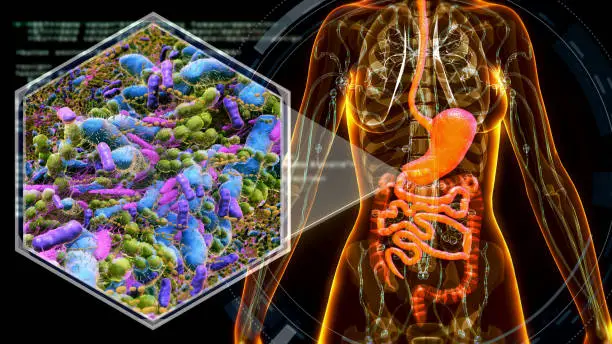The human gut microbiome, comprising trillions of microorganisms, is a complex ecosystem that plays a vital role in our overall health and well-being. This intricate network of microorganisms, including bacteria, viruses, fungi, and other microbes, influences various bodily functions, from digestion and nutrient absorption to immune system function and even mental health.

The Gut-Brain Axis: A Bidirectional Relationship
The gut microbiome communicates with the central nervous system (CNS) through the gut-brain axis, a bidirectional relationship that enables the exchange of signals and molecules. This connection allows the gut microbiome to influence mood, cognitive function, and behavior, while also responding to signals from the CNS.
Functions of the Gut Microbiome
1. Digestion and Nutrient Absorption: The gut microbiome breaks down complex nutrients, synthesizes vitamins, and regulates the absorption of minerals.
2. Immune System Modulation: The gut microbiome helps regulate the immune system, preventing overactive or underactive responses.
3. Production of Hormones and Neurotransmitters: The gut microbiome produces hormones and neurotransmitters, such as serotonin and dopamine, which influence mood and cognitive function.
4. Maintenance of the Gut Barrier: The gut microbiome helps maintain the integrity of the gut barrier, preventing the passage of toxins and undigested food particles into the bloodstream.
Factors That Influence the Gut Microbiome
1. Diet: A diet high in processed foods, sugar, and unhealthy fats can disrupt the balance of the gut microbiome.
2. Antibiotics and Medications: Broad-spectrum antibiotics and certain medications can alter the gut microbiome.
3. Stress: Chronic stress can disrupt the balance of the gut microbiome.
4. Lack of Sleep: Poor sleep quality and duration can negatively impact the gut microbiome.
Promoting a Healthy Gut Microbiome
1. Eat a Balanced Diet: Focus on whole, unprocessed foods, including fruits, vegetables, whole grains, and lean proteins.
2. Incorporate Fermented Foods: Fermented foods, such as yogurt, kefir, and sauerkraut, contain live cultures that can help support the growth of beneficial microorganisms.
3. Stay Hydrated: Adequate hydration helps maintain the health and diversity of the gut microbiome.
4. Manage Stress: Engage in stress-reducing activities, such as meditation, yoga, or deep breathing exercises.
5. Get Enough Sleep: Aim for 7-9 hours of sleep per night to help support the health of your gut microbiome.
By understanding the complex relationships within the gut microbiome and taking steps to promote its health, we can unlock the secrets of our inner ecosystem and cultivate a stronger, more resilient body.
